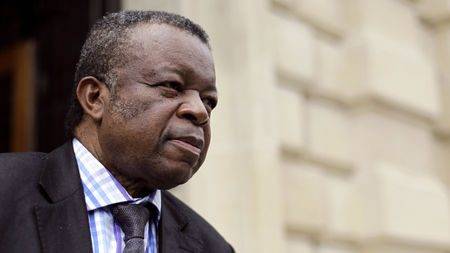Ebola Now Has A Cure And This Doctor Can Finally Smile After Devoting 40 Years Of His Life Into Fighting The Deadly Virus

For several years now, the deadly Ebola virus has ravaged parts of Africa intermittently, leaving hundreds of lifeless bodies in its wake and hundreds more at risk of getting infected.
While various African countries have been able to contain the virus and some others have even managed to oust it completely, the Democratic Republic of Congo hasn’t had it so good. In fact, the country has become something of a default home for the Ebola menace with 1,900 deaths recorded since the latest outbreak of the virus over a year ago.
But all that tragedy may soon be a thing of the past thanks to a Congolese doctor who may have managed to crack the Ebola code.
Dr. Jean-Jacques Muyembe-Tamfum is a top Ebola researcher who leads a team that has been working fervently on a cure for the deadly communicable disease. And it looks like their efforts have paid off — the team appears to have actually found a cure.
Dr. Muyembe-Tamfum’s team developed four treatments for the virus but a series of clinical trials have put only two of those treatments as frontrunners, having proved quite effective at treating Ebola.
The two experimental treatments that are showing remarkable promise are REGN-EB3; an antibody cocktail developed by Regeneron, and mAb114; a monoclonal antibody. During clinical trials, both treatments were found to improve survival rates from the disease significantly, more than any treatment ever developed.
By attacking the Ebola virus with a combination of monoclonal antibodies that neutralise its deadly effect on human cells, both treatments are found to increase survival rates for infected people to as much as 94 percent — quite high for a disease that almost never fails to take the life of its sufferers.
“From now on we will no longer say that Ebola is not curable. This advance will in the future help save thousands of lives that would have had a fatal outcome in the past,” Dr. Muyembe-Tamfum, Director-General of the Democratic Republic of the Congo’s Institut National de Recherche Biomedicale, announced.
The early days of the laboratory battle with Ebola can be traced to as far back as 1976 when a 34-year-old Dr. Muyembe-Tamfum started working to curtail the deadly disease after it made its first appearance in the DRC (then called Zaire).

Source: sciencemag.org
He hasn’t looked back since then, exploring lead after lead in trying to find a cure. It may have been a long time coming but some 43 years later, he appears to have cracked it. Since 1976, Dr. Muyembe-Tamfum has been helping his country in the fight against all outbreaks including the ongoing epidemic that started in August 2018.
Dr. Muyembe-Tamfum told the BBC that he has spent four decades of his life thinking about how to treat patients with the Ebola virus. For obvious reasons, he considers the breakthrough the biggest achievement of his life. And perhaps the crowning moment was when two Ebola patients were declared ‘cured’ after using his experimental drugs and released from a treatment centre in Goma, DR Congo.
It was a fitting end to years of painstaking work and he was visibly delighted with what he had achieved when he delivered the good news at a press conference that took place in Goma last week.
The experimental treatments were promptly administered on a mother and son who had been infected by their husband and father. They both recovered quickly.
Dr. Muyembe-Tamfum said the treatment was highly effective because the response team had dictated these cases very quickly and moved to act immediately; implying that early detection and early treatment is key. However, both patients will remain under close watch until the end of the 21-day surveillance period.
“We are at day 13, so there are still 8 days to go before we can say that Goma has won against Ebola,” says Dr. Muyembe-Tamfum, who is staying optimistic nonetheless.
In the absence of any unfortunate turn of events, Dr. Muyembe-Tamfum says the cure will be administered for compassionate use to all infected patients (at no cost), and this will offer much-needed respite to the ailing country.
Featured Image Courtesy: itg.be